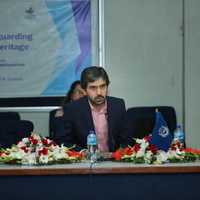
Dr Saad Malook
Dr Saad Malook holds a PhD in moral and political philosophy from the University of Canterbury, Christchurch, New Zealand. In his PhD thesis entitled, "The Ethics of Reverence for Humanity: A Rationale for a Cosmopolitan Common Mind for Global Peace", Dr Malook argues that mutual reverence among all members of humanity, irrespective of their races, cultures, ethnicities, colours, religions, or languages because of their unique human worth with particular potentials, is vital for acquiring peaceful coexistence. This mutual reverence can enable individuals to develop their human potential, such as rationality and creativity, that leads to create a kind of peace called positive peace. The central argument asserts that a cosmopolitan common mind of reverence for humanity is essential for global peace. This interdisciplinary project delves into ethics, politics, cosmopolitanism, collective action, and human development. Before his PhD studies, he earns his MA English Literature from the Forman Christian College, Lahore, MA Philosophy from the University of the Punjab, Lahore, and BA major in English Literature and Psychology from the Forman Christian College, Lahore. He was awarded the Khawaja Ghulam Sadiq Gold Medal, the Punjab University Gold Medal, and the K. B. Sheikh Nanak Bakhsh Silver Medal for his extraordinary achievements in his master's degree in Philosophy. He joined the Department of Philosophy, University of the Punjab, as a Lecturer on February 14, 2006. Besides teaching, Dr Malook edits Al-Hikmat: A Journal of Philosophy, a journal of the Department of Philosophy. He has been a member of the Faculty Board of Studies in Arts and Humanities and the Board of Studies in Philosophy. More than a dozen research papers in HEC-recognized journals are to his credit. Dr Malook's areas of research expertise and interests include Moral and Political Philosophy, Applied Ethics (Development Ethics, Environmental Ethics, Ethics of Artificial Intelligence, and Ethics of Human Rights), Philosophy of Social Sciences, Philosophy of Education, Game Theory, Global Peace, and Philosophy of Muhammad Iqbal.
less
Related Authors
Muhammad Mutawalli Mukhlis
Universitas Islam Negeri Alauddin Makassar
Asifa Abbas
Mehran University of Engineering and Technology
Farrukh Aziz Ansari
Quaid-i-Azam University, Islamabad, Pakistan
Mustofa Anshori Lidinillah
Universitas Gadjah Mada (Yogyakarta)
Wolfgang Palaver
University of Innsbruck
Adnan Rehman
Drew University
Nadeem Ahmad
Quaid-i-Azam University, Islamabad, Pakistan
Arik Dwijayanto
Universitas Sunan Giri
InterestsView All (11)









Uploads
Papers by Dr Saad Malook
common mind approach is essential for resolving global challenges that
cannot be resolved by individuals working independently from one
another, such as achieving global peace, cleaning the environment, and
improving public health. A ‘cosmopolitan common mind’ refers to an
intersubjective recognition across states, cultures, or continents. This
argument of the cosmopolitan common mind is centred on Philip Pettit’s
theory of the common mind and ethical cosmopolitanism. Pettit argues
that a common mind is a shared mind. The standard account of
cosmopolitanism claims all human beings are members of the human
community. This account is based on three key ideals: individualism,
egalitarianism, and universalism. Cosmopolitanism considers
individuals rather than nations or states, giving them equal moral status
across the world without any discrimination. A cosmopolitan common
mind can direct collective action across cultures or continents to resolve
global problems. Terrorism and climate change are global problems
that are not the products of individual actions but collective actions. For
instance, pollution is created by many people working together. If people
all together create pollution, they all together can stop it. The problems
of establishing global peace and clean ecology are similar to preventing
pollution because they are beyond the ability of any lone individual to
solve. If it is not impossible, there is a need to develop a cosmopolitan
common mind to acquire the common good. The research concludes that
the cosmopolitan common mind approach can be a promising
framework for resolving contemporary challenges. In qualitative
research methodology, I use empirically informed philosophical
analysis to critically evaluate documentary resources, including journal
papers, academic books, and the proceedings of conferences and
congresses.
common mind approach is essential for resolving global challenges that
cannot be resolved by individuals working independently from one
another, such as achieving global peace, cleaning the environment, and
improving public health. A ‘cosmopolitan common mind’ refers to an
intersubjective recognition across states, cultures, or continents. This
argument of the cosmopolitan common mind is centred on Philip Pettit’s
theory of the common mind and ethical cosmopolitanism. Pettit argues
that a common mind is a shared mind. The standard account of
cosmopolitanism claims all human beings are members of the human
community. This account is based on three key ideals: individualism,
egalitarianism, and universalism. Cosmopolitanism considers
individuals rather than nations or states, giving them equal moral status
across the world without any discrimination. A cosmopolitan common
mind can direct collective action across cultures or continents to resolve
global problems. Terrorism and climate change are global problems
that are not the products of individual actions but collective actions. For
instance, pollution is created by many people working together. If people
all together create pollution, they all together can stop it. The problems
of establishing global peace and clean ecology are similar to preventing
pollution because they are beyond the ability of any lone individual to
solve. If it is not impossible, there is a need to develop a cosmopolitan
common mind to acquire the common good. The research concludes that
the cosmopolitan common mind approach can be a promising
framework for resolving contemporary challenges. In qualitative
research methodology, I use empirically informed philosophical
analysis to critically evaluate documentary resources, including journal
papers, academic books, and the proceedings of conferences and
congresses.